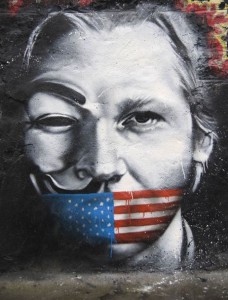Julian Assange: An Appeal From International Lawyers
Assange: The law of power or the power of the law?

The ongoing proceedings against Australian citizen Julian Assange, founder of WikiLeaks, presently held in Belmarsh Prison near London, display a grave erosion of time-honoured principles of human rights, the rule of law, and the democratic freedom to gather and share information. We would like to join the extraordinary line of earlier protests in the case.
Fifteen years ago, the world was shocked by serious circumventions of the right to due process and fair trial when, as part of the U.S. war on terror, the CIA ignored local authority to abduct people in secret flights from European jurisdictions to third countries where they were subjected to torture and violent interrogation. Among those voicing protests was the London-based International Bar Association; see its report, Extraordinary Renditions, January 2009 (www.ibanet.org). The world should stand firm against such attempts to exercise superior, worldwide jurisdiction and to interfere in, influence or undermine the protection of human rights in other countries.
However, since WikiLeaks released evidence of U.S. war crimes in Iraq and Afghanistan, the US has for nine years punished Julian Assange and deprived him of his freedom. To avoid extradition to the United States, Assange was compelled to seek asylum in the London embassy of Ecuador in August 2012. In April 2019, Ecuador — in violation of international asylum laws — handed Assange over to British police, and his private legal defence documents over to U.S. agents.
After exposing extensive U.S. abuse and power projection as a threat to international law and order, Assange himself experienced the full thrust of the same forces. Extortion of other countries to make them and their judicial systems bend the law is to undermine and violate human rights treaties. Countries must not allow the diplomacy and intelligence power culture to contaminate and corrupt the fair administration of justice in accordance with law.
Great nations like Sweden, Ecuador, and Britain have servilely complied with U.S. wishes, as documented in two 2019 reports by Nils Meltzer, U.N. Special Rapporteur on Torture and Other Cruel, Inhuman or Degrading Treatment or Punishment. Among other things, Melzer concludes that,
“In 20 years of work with victims of war, violence and political persecution I have never seen a group of democratic States ganging up to deliberately isolate, demonize and abuse a single individual for such a long time and with so little regard for human dignity and the rule of law.”
The U.N. High Commissioner for Human Rights/Working Group on Arbitrary Detention had already in 2015, and again in 2018, demanded the release of Assange from arbitrary and illegal detention. Britain is obliged to respect the CCPR rights and the rulings of the U.N./WGAD.
Assange is in precarious health and without the tools, time or strength for a proper defence of his rights. The prospects of a fair trial have been undermined in many ways. From 2017 onward, the Ecuadorian Embassy let a Spanish firm named Undercover Global send real time video and sound transmissions of Assange directly to the CIA, violating even the lawyer-client privilege by eavesdropping on his meetings with lawyers (El País 26 Sept. 2019).
Britain should follow the proud example of Iceland. That small nation firmly defended its sovereignty against a U.S. attempt in 2011 to exercise undue jurisdiction, when it expelled a huge team of FBI detectives that had entered the country and had started to investigate WikiLeaks and Assange without permission of the Icelandic government. The treatment of Julian Assange is below the dignity of the great nation that gave the world the Magna Carta in 1215 and the Habeas Corpus. To defend its national sovereignty and obey its own laws, the present British government must set Assange free immediately.
Signed by:
Hans-Christof von Sponeck (Germany)
Marjorie Cohn, (U.S.A.)
Richard Falk (U.S.A.)
Martha L. Schmidt (U.S.A.)
Mads Andenaes (Norway)
Terje Einarsen (Norway)
Fredrik S. Heffermehl (Norway)
Aslak Syse (Norway)
Kenji Urata (Japan)
*
Note to readers: please click the share buttons above or below. Forward this article to your email lists. Crosspost on your blog site, internet forums. etc.
Fredrik S. Heffermehl, cand. jur, LLM NYU, is a member of the TRANSCEND Network and ex-Vice President of the International Peace Bureau. He is the author of The Nobel Peace Prize, What Nobel Really Wanted (Praeger, 2010 – expanded versions in Chinese, Swedish, Finnish, Spanish and [2014] Russian). [email protected] – http://www.nobelwill.org.

